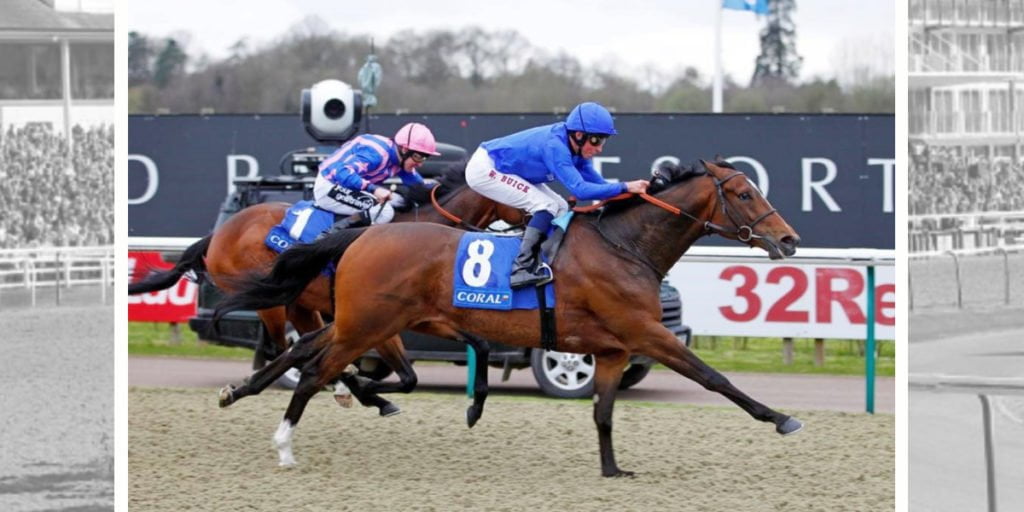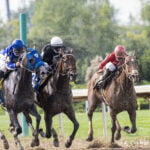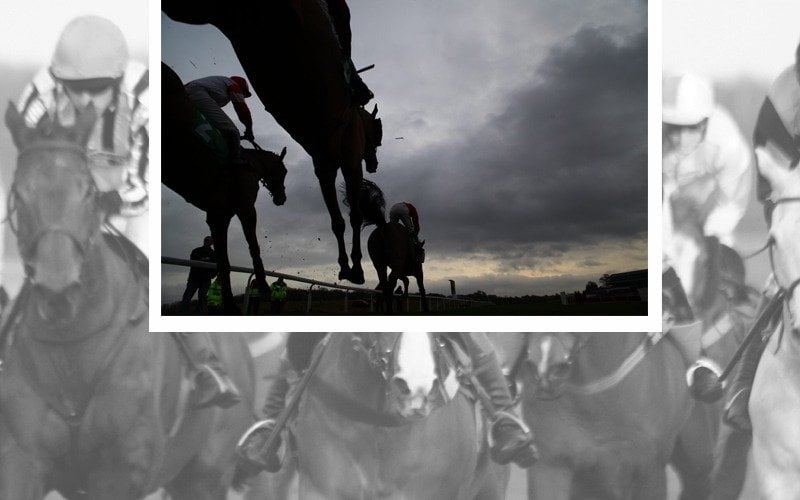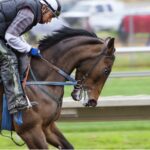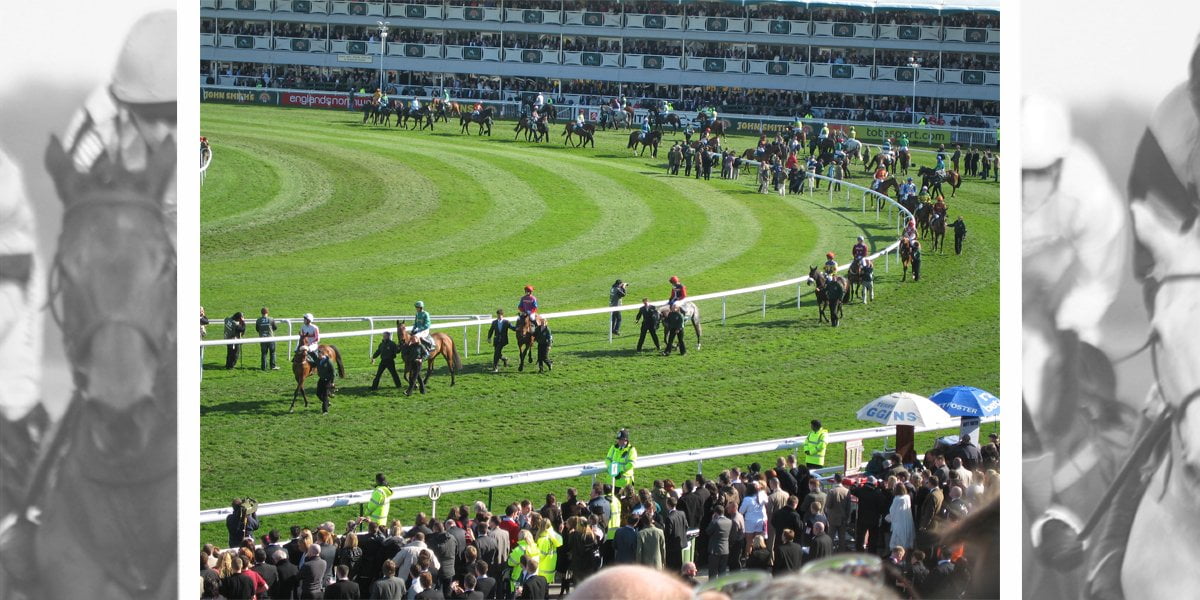[et_pb_section bb_built=”1″ admin_label=”section”][et_pb_row admin_label=”row” background_position=”top_left” background_repeat=”repeat” background_size=”initial”][et_pb_column type=”4_4″][et_pb_text background_layout=”light” use_border_color=”off” background_position=”top_left” background_repeat=”repeat” background_size=”initial” _builder_version=”3.0.100″]
All-Weather Racing was introduced relatively recently but has gained traction in the sport and has many specialists and supporters.
A timeline of its history is as follows:
1984
All-Weather racing in the UK was first considered as a result of the harsh winter of 1984/85 during which 72 Jump racedays were lost.
1987
The Jockey Club received seven proposals for the construction of All-Weather tracks in February, 1987.
1988
In December, 1988, Lingfield Park in Surrey was given permission to install an Equitrack surface on the inside of its turf track. Equitrack had hit the headlines in 1986 with the opening of the Al Bahathri gallop in Newmarket. It was also the surface of choice for the first All-Weather track in the world installed at Remington Park, Oklahoma, USA, in 1988.
1989
Southwell, at Rolleston in Nottinghamshire, was the second racecourse in Britain to be given the go-ahead to construct at All-Weather track in June, 1989.
The first All-Weather raceday in the UK was staged at Lingfield Park on 30th October 1989, with the opening race going the way of the Conrad Allen-trained Niklas Angel, partnered by Richard Quinn and owned by Peter Charalambous.
Southwell’s first All-Weather Flat fixture took place nine days later. It was the first racecourse in the world to utilise Fibresand on the outside of its turf course. The surface was already installed at all four of Britain’s major training centres – Epsom, Lambourn, Malton and Newmarket.
During its first year, All-Weather racing generated an estimated £580,000 in extra revenue through levy payments.
1993
Wolverhampton Racecourse also opted for Fibresand when replacing its turf course and staged the first floodlit fixture in the UK on 27th December 1993.
1995
By 1995, there were 125 All-Weather racedays spread across the three venues. Wolverhampton’s Wulfrun Stakes, introduced in December, 1995, was the first Listed race on the All-Weather in Britain.
1998
The Winter Derby, first run in 1998 at Lingfield Park, was given Listed status in 1999 and upgraded to Group Three level in 2006.
2001
Advances in All-Weather surfaces saw Lingfield Park replace its Equitrack with Polytrack at the cost of £3 million in November, 2001.
2004
Wolverhampton switched to Polytrack in October, 2004.
2005
On 9th July 2005, Lingfield Park staged the Group Three Silver Trophy Stakes, the first Group contest run on the All-Weather in Britain. The mile contest went the way of Geoff Wragg-trained Autumn Glory, ridden by Steve Drowne and owned by Mollers Racing, who held off subsequent Group One victor Court Masterpiece by a neck.
2006
Kempton Park, at Sunbury on Thames in Middlesex, moved its Flat programme on to a floodlit Polytrack surface in March, 2006.
The same year also saw a third of all Flat fixtures (285 + 24 mixed) in the UK take place on All-Weather surfaces.
2007
Dundalk, Ireland’s only All-Weather track, staged its first raceday on an artificial surface on 26th August 2007.
2008
Great Leighs opened for business in April, 2008, with an eight and a half furlong Polytrack circuit. It was the first new racecourse to open in Britain since Taunton in 1927, but the Essex track went into administration in January, 2009.
2013
The inaugural All-Weather Championships, aimed at improving the image and quality of All-Weather racing, commenced in October. The initiative saw £2 million of extra prize money injected into the All-Weather season by ARC, with a £1-million All-Weather Championships Finals Day at Lingfield Park on Good Friday, 2014.
A consortium headed up by Betfred owner Fred Done bought Great Leighs in December, 2013 and renamed the track Chelmsford City Racecourse.
2014
On 18th April 2014, the most successful All-Weather day was held at Lingfield Park, with a sell-out Good Friday crowd witnessing the best All-Weather racing ever staged in Britain.
On 28th April 2014, it was announced that Wolverhampton would become the first course in Britain install the Tapeta surface. The track held its first fixture on the new surface on 11th August.
2015
Racing resumed at Chelmsford City on 11th January 2015, with subsequent Group One winner and All-Weather Champion Tryster winning the first race at the re-opened course.
The second All-Weather Championships Finals Day went very well on Good Friday, 3rd April at Lingfield Park.
On 9th June 2015, ARC unveiled an £11-million investment into Newcastle Racecourse, including the introduction of a new Tapeta track, with All-Weather racing set to commence in May, 2016.
2016
The third All-Weather Championships Finals Day happens at Lingfield Park on Good Friday, 25th March, when a record crowd of 10,319 attended.
Following a near £12-million investment by ARC, Newcastle Racecourse hosts its first All-Weather fixture on 17th May 2016. The Tapeta track includes the only floodlit straight mile in the UK.
2017
Good Friday, 14th April, sees two other ARC tracks, Newcastle (Tapeta) & Bath (turf), race for the first time alongside Lingfield Park. There is another record attendance at Lingfield Park with 10,770 racegoers in attendance.
2018
The All-Weather Championships continues to go from strength-to-strength and is in its fifth season.
[/et_pb_text][/et_pb_column][/et_pb_row][/et_pb_section]

Karen can usually be found glued to her computer or at the stables. Having edited several national magazines she co-founded Eclipse Magazine in 2008 after realising that many of her friends were nervous about going racing due to lack of information – what to wear, how to bet etc.
She absolutely loves her job (how many people can say that?!) and is truly grateful to all supporters of and contributors to Eclipse Magazine.
If you are reading this she would like to say THANK YOU! (And please spread the word about Eclipse…!!)


